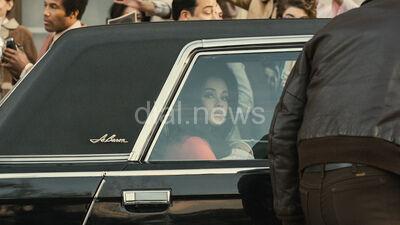[ad_1]
In obviously tight collaboration with cinematographer Phillipe Le Sourd (who shot Coppola’s “The Beguiled”) and editor Sarah Flack (whose been with Coppola since the great “Marie Antoinette;” I’m obliged here also to disclosed that Sarah is a friend), Coppola gives us a world of beautiful and surprisingly still surfaces. In her room in a modest house in Germany, Priscilla reads fan magazines; once out in Graceland and instructed not to make herself seen on the lawn too much, she reclines in living rooms and dens that got a lot tackier after she divorced Presley in the early 1973. A lot of the times Priscilla just doesn’t know what to do with herself. As her superstar husband has his film career mismanaged by a never-seen-Colonel Tom Parker (did Sofia Coppola see Hanks in “Elvis” and say, “There’s just no topping Tom Hanks, I shouldn’t even try?” Actually, I don’t think that’s it), he’ll leave Memphis for Los Angeles and tell his bride to “keep the home fires burning.”
What’s Priscilla there for, anyway? Especially since, having arranged to separate her from her family and be more or less something like her guardian, he firmly refuses to sleep with her despite her increasing requests for intimacy. When they first meet in Germany, Elvis, completely sincere and earnest, tells the ninth-grader (and he here is shocked to be told that she’s that young) that he is lonesome for a girl to talk to. His mom had just passed away. It all seems so innocent.
In their early relationship, they’re both naïfs. Elvis has a poster of “On The Waterfront” in his bedroom, and he tells Priscilla that when he returns to the States, he wants to study at the Actor’s Studio, emulate Marlon Brando and James Dean. He takes her to see “Beat the Devil” and Priscilla is amused and a little awed that her friend knows all of Bogart’s lines in the movie by heart. He dreams of an expansive artistic life. She dreams just of being with him. Of the two, only one will have their dreams come true. And then the dream won’t be enough.
This cool, unhurried movie is firmly anchored by a spectacularly modulated performance by Caillee Speeney. The 25-year-old plays fourteen so damn well the viewer almost doubts that she’ll be able to credibly age into a woman nearing thirty. But she does, beautifully. As Elvis, Jacob Elordi towers over her; the contrast is an exaggeration from real-life, but an effective one. This Elvis is soft-spoken, given to discomfiting bursts of anger as he comes to rely more and more on medications to boost energy, get to sleep; all the stuff that killed the man in the end is here in ostensibly more manageable form, but Coppola’s storytelling does convey its insidious creep. The movie does enjoy itself getting into some of Presley’s early ‘60s idiosyncrasies; he goes through a Bible-study phase, reads Autobiography of a Yogi, and even experiments with LSD with Priscilla; Coppola’s brief depiction of their trip is one of the more credible accounts of psychedelic experience in recent film. And all this time, even through movie-set affairs rumored and/or real, he keeps Priscilla chaste until after marriage. And then knocks her up immediately.
[ad_2]

